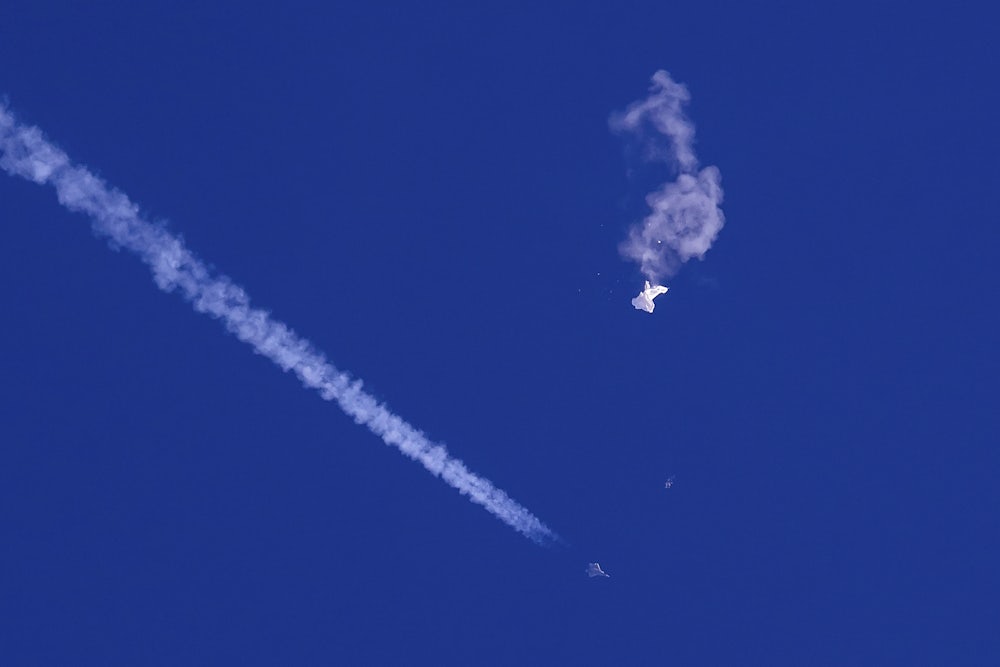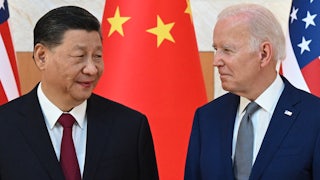We live in an era defined by extreme political stupidity, where the idiotic and nonsensical are wrung out of every incident and policy decision—from gas stoves and drag shows to Hunter Biden’s laptop.
Yet, even in a country where outrage has seemingly become one of America’s leading energy sources, the ongoing national meltdown over the Chinese spy balloon has been a new, stupid low.
President Biden “has surrendered American airspace to Communist China,” bellowed former President Donald Trump, omitting the fact that three such balloons flew over the United States during his one term in office.
According to Florida Senator Marco Rubio, the balloon incident—and the decision by Biden to wait several days to shoot it down—shows “that the United States is a once-great superpower that’s hollowed out, it’s in decline.”
“The Chinese Communist balloons could be trial runs for low visibility deliver[y] of devastating EMP weapons,” warned former Speaker of the House Newt Gingrich. However, House Oversight Committee Chair James Comer topped everyone by asking, “Did that balloon take off from Wuhan?” a reference to the Chinese city where Covid-19 originated.
Meanwhile, according to senior Pentagon officials, the balloon posed no physical or military threat to the U.S. and provided China with minimal intelligence value. Biden critics who fretted that the balloon flew over nuclear missile installations in Montana seemed unaware that such images are readily available on Google Earth. The whole imbroglio is reminiscent of the national freak-out that accompanied the flight of the Russian satellite Sputnik in 1957. And considering that the U.S. has devoted considerable resources to surveilling China’s coastline, the response has a malodorous whiff of hypocrisy.
Indeed, what is perhaps the most bizarre aspect of the balloon incident is that for all the political focus in the U.S. on Biden’s handling of it, the entire episode has been humiliating for China.
Whatever limited intelligence insight the surveillance balloon might have provided, it’s more than outweighed by the diplomatic and political embarrassment of getting caught. According to Lyle Goldstein, who studies the Chinese military at the Defense Priorities think tank, it’s rather telling that Chinese media have said “almost nothing on the matter,” which supports the theory that the incident “is highly embarrassing for Beijing.” In Goldstein’s view, the whole incident “shows incompetence, poor planning, and poor coordination between the Chinese government and the nation’s scientific and military communities.”
The diplomatic fallout is already being felt. On Friday, Secretary of State Antony Blinken canceled a planned trip to Beijing hours before he was scheduled to depart. The move is surely an embarrassment to Chinese President Xi Jinping. And at a time when the Chinese leader is trying to improve relations with the U.S., the balloon’s jaunt has almost certainly sent things in the opposite direction.
However, for the growing band of China hawks in the U.S., the balloon—as balloons often do—produced childlike joy. Over the past two years, a motley collection of policy mavens, military officials, and opportunistic politicians have pushed the notion that China is the next bogeyman for the U.S. to confront. Foreign policy journals are now inundated with warnings about a potential invasion of Taiwan and a newly aggressive Chinese militarism.
In 2021, Admiral Philip Davidson told Congress that he believed that an invasion of Taiwan could happen in the “next six years,” and last month, Gen. Michael Minihan, who is the head of the Air Force’s Air Mobility Command, sent a bizarre memo to his command warning that “my gut tells me” the U.S. will go to war in China in 2025—so he urged them to get “their personal affairs” in order and improve their shooting skills. Indeed, such attitudes are rife in the military, even as most analysts in the China policy community remain deeply skeptical that China has any near-term plans to go to war in the Taiwan Strait.
But it’s in the political realm where China bashing is making the loudest din. While an increasing number of Republican politicos are adopting Trump’s isolationist, America-first rhetoric, attacks on China are seemingly the one place where the GOP has found consensus on foreign policy.
In 2021, GOP presidential candidate Nikki Haley called for a boycott of the 2022 Winter Olympics in Beijing and warned that if China takes over Taiwan, it would be emboldened to do the same elsewhere. Another 2024 aspirant, former Secretary of State Mike Pompeo, has released a series of YouTube videos bashing the Chinese. And in Trump’s announcement speech last fall, he attacked Beijing over the Covid pandemic and said that China is “watching us die, and they’re laughing as it happens.”
The Republican meltdown over the spy balloon was simply more of the same—though amped up with accusations that Biden is “coddling and appeasing the Chinese communists,” and that Beijing’s brazen spying proves that Xi “does not fear or respect Joe Biden.”
It’s easy to chalk this up as mere domestic politics, but the policy implications could be severe. The fact is, U.S.–China relations are not in a good place right now, and while China deserves blame for making things worse with the balloon incident, the political backlash in the U.S. will limit Biden’s ability to calm tensions.
While Blinken was more than justified in canceling his upcoming trip to Beijing, the furious GOP response to the balloon precluded all other options. As Goldstein pointed out to me, Washington and Beijing have a host of issues to discuss—from trade to Taiwan. “We need a real strategy with China to move ahead on a series of issues,” he told me. “And this incident makes things more difficult.” It’s a distraction from potential flashpoints between the two superpowers that could get far more dangerous than a wayward surveillance balloon. The frostier tensions get, the more likelihood there is for potential conflict down the road. This incident not only risks provoking a more belligerent U.S. attitude toward China, but it further narrows the opportunities for cooperation and conciliation.
So while the U.S. response to balloongate ran the gamut from inane to moronic, that stupidity could have dangerous consequences.






